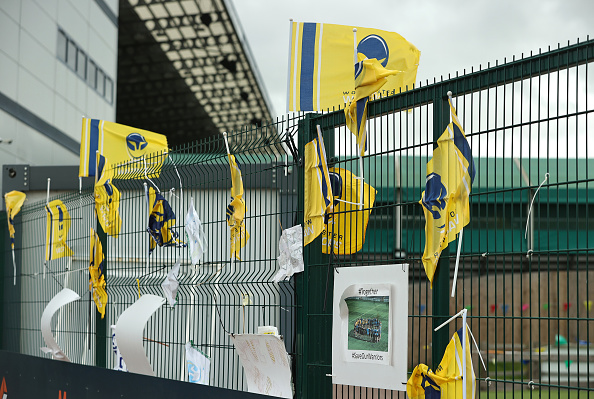Worcester Warriors placed into administration after suspension

Premiership rugby club Worcester Warriors have been placed into administration by the Department for Digital, Culture, Media and Sport (DCMS) after failing to provide proof of a “credible” financial plan.
The financially stricken West Midlands outfit had until 5pm on Monday to provide the sport’s governing body, the Rugby Football Union (RFU), with detailed assurances or face suspension from top flight rugby.
Worcester did not satisfy the RFU so were promptly expelled from all competitions before DCMS placed WRFC Trading Limited, the company which owns the club, into administration – leaving them at risk of relegation and a player exodus.
“We understand the past few months have been difficult for the players, staff and fans,” a DCMS spokesperson said.
“We have worked around the clock with the club’s directors, the PRL [Premiership Rugby] and the RFU to explore all possible options but during this time the owners have been unable to secure new investment for the club.
“In order to give the club the best possible chance of survival, and to protect a significant taxpayer investment, we have agreed to the directors’ request to place the club into administration.
“We will now apply to the court to appoint administrators and will begin work to explore all possible options to protect creditors and preserve the local rugby offering in Worcester.”
Worcester’s owners, Colin Goldring and Jason Whittingham, also have the majority stakeholding in League One side Morecambe – which they have recently put up for sale.
The pair have previously appeared reluctant to put the club into administration in the past and yesterday there were suggestions that they had asked for a 72-hour extension to their deadline.
The saga has raised questions about whether Premiership Rugby and the RFU’s owner’s tests are robust enough, what happens to games Worcester have already played, and whether the league must restructure to accommodate the temporary loss of one team and the financial impact of that.
More urgently, it leaves the future of the club and their players on a knife-edge.
“While it is the responsibility of each business owner to manage their individual finances, we will look at learnings from this situation to see what regulation can be put in place to provide all parties with more financial transparency,” RFU chief executive Bill Sweeney said in response to the suspension.
“As negotiations with possible investors have still not led to critically-needed funding, administration is seen as the best solution to safeguard the interests of the business and ensure the best chances of a solution that saves the club,” a Worcester Warriors statement added.
With the club in administration, it is believed that they will have six weeks to sort out their predicament or face permanent expulsion from this year’s competition. Furthermore, players are expected to be able to immediately leave their contracts.
“All rugby fans will be hoping that administration will be the club’s salvation, but it may not be without consequence,” Ben Cisneros of Morgan Sports Law told City A.M.
“Under the Standard Premiership Contract, players will now be entitled to terminate their contracts with immediate effect and, under RFU Regulation Five, the club may be relegated.”
The club could play again this season but still be relegated to the Championship for next season.
Jim O’Toole, former chief executive and part of the only public bid for the club, said prior to the DCMS announcement: “We remain ready, as we always have been, to get involved as soon as DCMS pulls the trigger and places the club into administration.”
Following the announcement, his bidding partner James Sandford simply said: “Time to strap in tight!”
What happens next is uncertain. While there may be some relief, administration does not necessarily mean the club will be rescued and there remains a chance that another community hub will fail, leaving hundreds affected.
In the longer term, there are likely to be urgent discussions among the sport’s organisations to make sure something like this doesn’t happen again.